|
LIANG MING CHENG
China's art administration has five divisions: north, east, west, south, and central. The Guangzhou Academy of Fine Arts serves the six provinces of the southern region. The president of the Academy, Liang Ming Cheng, does double duty as administrator and sculptor.
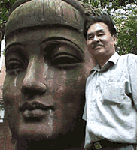
Liang and one of his sculptures in the Academy's garden.
Like most artists over 40, Liang has been slow to warm to new foreign art forms. He prefers realism, a taste he acquired during his student days when China marched in step with communist Russia.
China, he advises, should not jump trains from going the Russian way to now going the Western way. China should find its own track. Until the "opening," no Western art, no book even, was permitted in the country. Then in the 1980's many Western ideas came in, but now it is best for China to concentrate on Chinese art forms.
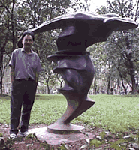
Still, many Chinese art students travel in Europe and America, and Liang has been to Italy. The art he saw inspired him.
Liang's recent work, a futurist sculpture.
The Italian Futurists were totally enamored of speed, but Liang's sensuous discus thrower towers ominously. Too much fast change is dangerous, the work cautions. This conservative theme is endemic among artists. Their risk-taking lags far behind the dynamic business community building a new China.
XU TAN
|
London showed up early for Xu's show and tell at Libreria Borges, a bookstore engulfs owner Chen Tong's modest apartment. On the wall are framed photos of Alan Ginsburg, Umberto Eco, Nabakov, and Borges. The books, stacked everywhere -- art books about Bacon, Duchamp, Miro, and translations of Melville, Poe, Doctorow, and a few Shakespeare plays. The French luminaries, Foucault, Bourdieu, and Derrida are represented in depth.
|
The French cultural attache has seen fit to support a bookstore that brings world literature to Guangzhou's writers and artists. |
Xu arrived carrying slides and a slide projector. He's a Big Tail Elephant, one of four in a group known for their aggressive social criticism. An easy-going bear of a man with a ready laugh, he did not have the air of a determined faultfinder.
Detail of installation, Average Speed, Changing Speed
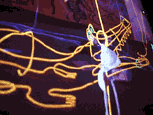
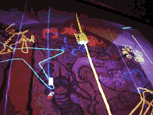
At first glance, "let it all hang out," sums up his critical position. But there's method in his madcap casbah. He lumps together lobster and crab from an upscale Guangzhou restaurant (Arc de Triomphe), Renaissance paintings (his copies), tacky neon light plastic, Schwartzeneger, a taxi's rearview mirror Mao, and plenty of other street junk that he'd be happy to identify if you would only ask. And the theme is -- the envelope please - disharmony in society!
|
"Knowledge is power. Is power power? In my dreams I become a pig with human brains and organs, and I possess enormous power."
|
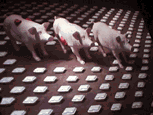
|
Installation Detail,
The Pig Dreaming
|
Three piggies are parked in a grid of Styrofoam takeouts backed by a billboard proclaiming:
"Knowledge is power. Is power power? In my dreams I become a pig with human brains and organs, and I possess enormous power."
Figure that one out and you're in the class of Zhuang Zi, a legendary Chinese poet. In a dream he became a butterfly, but then wondered, maybe the butterfly became Zhuang Zi.
|
|
Detail, the New Order
|
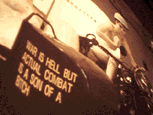
|
|
Long live Chairman Mao. Down with U.S. imperialism. Down with Soviet revisionism. These were the first English words that Xu learned, in that order. During the Cultural Revolution, the schools jettisoned Russian, and all kids had to study English. But all they learned were political slogans.
Now Xu speaks passable English. In the winter of 1996, he hung out at the artist workshop, Vermont Studio Center. For his project he turned three truckloads of soil into a pyramid. Maybe he thought the Center was a sandbox. No, the pyramid is a symbol of power. Its proportions are related to human proportions, and so it is a potent symbol of human power.
|
Long live Chairman Mao. Down with U.S. imperialism. Down with Soviet revisionism. These were the first English words that Xu learned, in that order.
|
|
With that in mind, Xu proceeded to cut the pyramid, chop it apart, and spread the soil around.
|
|
The pyramid, well on its way to being wiped out.
|
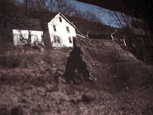
|
|
Xu's exuberance and humor is an important part of his message. Art should not always be serious, heavy handed; uplifting, obedient to the nostrums old guard artists learned from Soviet Russian teachers. Sometimes art should be a goof.
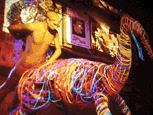
Spielberg, an installation
|
|